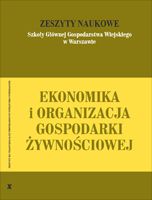Main Article Content
Article Details
HAMMU. Promotion Strategies and Arguments for Organic Food in European Countries. [in:] Proceedings of the Conference Organic Food and Farming-Towards Partnership and Action in Europe, 10-11 May 2001, Copenhagen, Denmark, Danish Ministry of Food, Agriculture and Fisheries, p. 187-193.
KALTOFT P. Values about Nature in Organic Farming Practice and Knowledge. Sociologia Ruralis. 1999, l39, p. 39-53. (Crossref)
ŁUCZKA-BAKUŁA W. Handel żywnością ekologiczna w opinii konsumentów. [w:] Sołtysiak U. Rolnictwo ekologiczne - od producenta do konsumenta. Stowarzyszenie EKOLAND, Stiftung Leben&Umwelt, Warszawa 1995.
MICHELSEN J. Organic Farming in a social context. [in:] Proceedings of the Confernce Organic Food and Farming-Towards Partnership and Action in Europe, 10-11 May 2001, Copenhagen, Denmark, Danish Ministry of Food, Agriculture and Fisheries, 2001, p. 74-79.
MORGAN K., MURDOCH J. organic vs. Conventional agriculture: knowledge, power and innovation in the food chain. Geoforum, 31, p. 159-173, ITC (2003) 2000 www.intracen.org/mds/sector/organic/welcome.htm (Crossref)
Rolnictwo ekologiczne - model przyszłości. Boss. Rolnictwo, 2002, Nr 10.
RUNOWSKI H. Popyt na żywność ekologiczną. [w:] Metera D., Bednarek A. (red.): Marketing produktów ekologicznych w północno-wschodniej Polsce. Fundacja IUCN, Warszawa 1999.
RUNOWSKI H. Stan i uwarunkowania popytu na żywność ekologiczną w Polsce. [w:] Organizacyjno-ekonomiczne aspekty rolnictwa ekologicznego. Wydawnictwo SGGW, Warszawa 1999.
RUNOWSKI H. 2003. Rolnictwo ekologiczne w Polsce na tle tendencji światowych. Zeszyty Naukowe SGGW, Ekonomika i Organizacja Gospodarki Żywnościowej, (49), 245-262.
SOŁTYSIAK U. Rolnictwo ekologiczne - historyczny przegląd metod. [w:] Sołtysiak U. (red.) Rolnictwo ekologiczne. Od teorii do praktyki. Stowarzyszenie EKOLAND i Stiftung Leben&Umwelt, Warszawa 1993.
SOŁTYSIAK U. Atestacja i oznakowanie produktów i gospodarstw ekologicznych w Polsce na tle sytuacji w Europie. [w:] Radecki A., Bednarek A., Zawadzki B., Łabętowicz J. (red.): Ekologiczne i integrowane rolnictwo w Polsce. Wyd. Fundacji Rozwój SGGW, Warszawa 1995, s. 98-120.
SZYMAŃSKA J. Rolnictwo ekologiczne - system produkcji gwarantujący wysoką jakość spożywczą produktów rolnych. [w:] Agrobiznes 2003. Jakość jako podstawowy instrument konkurencyjności w agrobiznesie. Prace naukowe AE im. O. Langego we Wrocławiu, 2003, Tom 2, s. 401-408.
The World of Organic Agriculture. Statistics and Emerging Trends, IFOAM, FiBL, za lata 2000-2005.
ŻAKOWSKA-BIEMANS S., GUTKOWSKA K. Rynek żywności ekologicznej w Polsce i w krajach Unii Europejskiej. Wydawnictwa SGGW, Warszawa 2003.
Downloads
- Dorota Witkowska, Anna Gasek, Zastosowanie testu Perrona do badania punktów zwrotnych indeksów giełdowych: WIG, WIG20, MIDWIG i TechWig , Zeszyty Naukowe SGGW - Ekonomika i Organizacja Gospodarki Żywnościowej: Nr 60 (2006)
Możesz również Rozpocznij zaawansowane wyszukiwanie podobieństw dla tego artykułu.
- Agnieszka Borowska, Postawy europejskich konsumentów wobec produktów tradycyjnych i regionalnych , Zeszyty Naukowe SGGW - Ekonomika i Organizacja Gospodarki Żywnościowej: Nr 72 (2008)
- Agnieszka Borowska, Zmiany na rynku jabłek w krajach Unii Europejskiej w latach 2000–2010 , Zeszyty Naukowe SGGW - Ekonomika i Organizacja Gospodarki Żywnościowej: Nr 108 (2014)
- Agnieszka Borowska, Przemiany w spożyciu owoców w Polsce i krajach Unii Europejskiej w latach dziewięćdziesiątych , Zeszyty Naukowe SGGW - Ekonomika i Organizacja Gospodarki Żywnościowej: Nr 39 (2000)
- Agnieszka Borowska, Małgorzata Kosicka, Informacja z konferencji naukowej "Polskie gospodarstwa domowe w procesie integracji z Unią Europejską" , Zeszyty Naukowe SGGW - Ekonomika i Organizacja Gospodarki Żywnościowej: Nr 38 (2000)
- Agnieszka Borowska, Zmiany na rynku śliwek w Polsce w latach 2010–2016 ze szczególnym uwzględnieniem śliwek regionalnych z oznaczeniami geograficznymi ChOG , Zeszyty Naukowe SGGW - Ekonomika i Organizacja Gospodarki Żywnościowej: Nr 124 (2018)
- Agnieszka Borowska, Informacja z przebiegu seminarium polskich i niemieckich doktorantów zorganizowanego 1 października 1998 roku w Szkole Głównej Gospodarstwa Wiejskiego w Warszawie , Zeszyty Naukowe SGGW - Ekonomika i Organizacja Gospodarki Żywnościowej: Nr 36 (1999)
- Agnieszka Borowska, Sytuacja ekonomiczna gospodarstw domowych w krajach Unii Europejskiej i w Polsce w latach dziewięćdziesiątych , Zeszyty Naukowe SGGW - Ekonomika i Organizacja Gospodarki Żywnościowej: Nr 48 (2003)
- Agnieszka Borowska, Tadeusz Filipiak, Informacja o konferencji naukowej "Kierunki i możliwości zrównoważonego rozwoju gospodarki żywnościowej" , Zeszyty Naukowe SGGW - Ekonomika i Organizacja Gospodarki Żywnościowej: Nr 43 (2001)
- Agnieszka Borowska, Maria Zajączkowska, Przemiany w spożyciu żywności w wybranych krajach CEFTA , Zeszyty Naukowe SGGW - Ekonomika i Organizacja Gospodarki Żywnościowej: Nr 38 (2000)
- Agnieszka Borowska, Unijny system ochrony żywnościowych produktów regionalnych i tradycyjnych , Zeszyty Naukowe SGGW - Ekonomika i Organizacja Gospodarki Żywnościowej: Nr 71 (2008)





